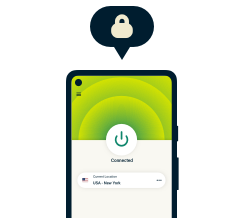There’s a lot that goes on behind the ExpressVPN app’s simple interface. We’re constantly upgrading our network in ways that improve our customers’ experience—but may not be immediately noticeable to you as a user.
This upgrade, however, is different.
We’re replacing our 1Gbps servers with new 10Gbps servers around the world. That means you can expect:
- Faster speeds
- More reliable connections
- More frequent improvements to our network
Why 10Gbps means a better VPN experience
When you connect to a VPN service, you’re really connecting to a VPN server, a physical piece of hardware that encrypts and decrypts your internet traffic on its way to and from the apps and websites you use.
A single VPN server must be able to handle traffic from multiple users, all with their own constantly changing demands. That’s why bandwidth is so important: it’s the total amount of data that one server can transmit every second. For our new servers, that’s 10Gbps—10 Gigabits (10 billion bits) per second.
More bandwidth does not imply faster speeds by itself. It’s more like adding lanes on a highway. A wider highway does not turn a Kia into a Ferrari, but it does allow multiple cars to go faster when they’re all on the road at the same time.
In a similar way, 10Gbps servers can handle more traffic with less congestion, and thus better speeds. Early tests show some of our customers are already experiencing 40–50% faster download speeds as a direct result of the upgrade.
Better hardware means better performance with Lightway
We developed our own next-generation VPN protocol, Lightway, with speed in mind. But it’s only as fast as the hardware it runs on.
With 10Gbps network cards and more cores per server, we’re finally able to give Lightway the hardware it needs to reach the incredible speeds it was designed to deliver.
More cores means better quality of service
This upgrade isn’t about increasing the number of VPN servers. Although this has sometimes been used as a shorthand measure of service quality, it has long been understood that total server count just isn’t that meaningful a number. Any provider could string together a network of cheap, outdated servers—but that wouldn’t deliver a better experience.
In fact, the quality of servers matters much more than the quantity. And a good VPN experience depends on a complex combination of bandwidth, hardware, software, and other factors.
One of those factors is the number of cores (processing units), which this upgrade will dramatically increase: Most of our previous servers had four cores per server, while our new ones contain anywhere from 20 to 32 cores per server.
This huge increase in processing power will drastically decrease the number of customers sharing the same resources. That means fewer interruptions, more reliable connections, and a smoother overall experience for each customer.
Better servers mean faster innovation
These new server upgrades aren’t just about improving the immediate customer experience, however.
More bandwidth and more processing power will also give our engineers the space they need to test more improvements to our network. Faster innovation means faster upgrades and even better quality of service for customers down the line.
When will these upgrades take effect?
They’ve already begun! To date, we’ve upgraded servers in 24 of our most high-demand countries, representing more than 70% of our global bandwidth. We will continue with these upgrades over the next few months and aim to have these new servers in as many locations as we can.
Note that each server location you see in your ExpressVPN apps represents not one single server but a cluster of servers working together. We may retire old servers, but you’ll have just as many choices as always, with a wide selection of popular locations in 105 countries around the world.
New hardware, same built-in privacy
Our hardware may be changing, but our commitment to privacy isn’t. Each new server has the same essential privacy protections, including:
- TrustedServer, our 100% RAM-only server tech that wipes itself on every reboot
- Private DNS, for encrypted DNS requests that cut out third parties and prevent leaks
- No activity logs and no connection logs, a strict privacy policy that’s been independently audited by security experts at PwC.
Thanks to our new server upgrades, we’re now able to deliver the same world-class privacy benefits faster and more reliably than ever before.

Take the first step to protect yourself online
30-day money-back guarantee


























Comments
I have as my primary email, a @tampabay.rr.com email. Every time I try and send an email from this address, the email goes to and remains in the draft box until I close down my VPN. Once I do that, the email goes out to addressees with no problem. Then I have to go and select my location again to activate my VPN. It does not do this when using my gmail.com address, works fine. Appreciate any assistance I can get. Thank you.
I’ve been a client of Express VPN for 4 year now because I used live in China to unlock the Western internet. When I returned to Europe I still kept my subscription with Express VPN even though its possible to find VPN for cheaper, I stayed with Express for a few reasons, and the Speeds are one of them, Im really happy about the 10Gbits upgrades that’s why I’ll never switch to another service (the customer service is also on point at all times).
Just few questions:
{Is it safe to use Expressvpn app, signed in?
If so, doesn’t that leave traces of personal information?
Also, somewhere it states that servers delete bits of data (and/or logs) every reboot, how long (in seconds) is the reboot/reset?
If the server has reset/reboot functionality; doesn’t that leave logs vulnerable? }
I use ExpressVPN, so not fudding!
Yes, it is safe to sign into and use ExpressVPN. This is because we have a strict policy of not logging users’ online activity or VPN connections. Our servers are painstakingly designed to not collect information–harder than the other way around! Our privacy policy states the various bits of information that we collect, and as far as personal information goes, that’s just your name, email, and payment info: https://www.expressvpn.com/privacy-policy
Yes, our servers are designed so that data is wiped with every reboot. However, the purpose is not to wipe user logs, since we don’t collect logs. Logs are not vulnerable when they don’t exist. Does it help to have this system in place if a user log somehow snuck in? Yes, definitely.
The same can be said for, say, kicking out potential attackers from our system. It’s also a highly unlikely event, but a reboot that wipes all data would also remove an attacker.
All of our security measures contribute piece by piece to a more private and secure experience for our users. We have an extensive article about how TrustedServer works coming out this week on the blog. I hope you’ll check it out.
Well you guys don’t explain it in detail. Obviously for a given server location e.g. Hong Kong, it was never only limited to 1 Gbps only; that would be not sufficient for hundreds or thousand of users simultaneously connecting.
It was always multiple 1 Gpbs servers behind each server (the name of a server in a specific location) and additionally x instances behind that.
Never had any trouble reaching 250 Mbit/s on download with server locations near me, even with but upload is always somewhat slower.
I would like to know about any upgrades that directly protect my personal account information?
One of our new privacy features is Threat Manager. Read about it here: https://www.expressvpn.com/blog/introducing-threat-manager-stop-apps-from-tracking-you/
1. Do I still have a paid account or is it out of time
2.forgotten how to use the vpn , do I put location as where I am or where I want to go through
If you are signed in to the app, you can see when your account expires by going to “Account” or “Account status” in the app (the process varies slightly depending on your device). To use the VPN, choose the location where you want to appear to be.
Why do I have to reconnect to EarthLink each morning from ios but don’t have to if I signin from windows first